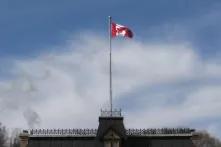Dossier: The 2015 Canadian Federal Elections
Canada and Europe need to build a firewall against US tech coercion
Commentary
Main image in widescreen?
uploaded image ratio
Has Background Color
Off
Exclude from archive and outdated
Off
Canada tries to make tech more Canadian - Exploring digital platform regulation Bills C-11 and C-18
Analysis
Main image in widescreen?
uploaded image ratio
Has Background Color
Off
Trudeau’s Foreign Policy: Progressive Rhetoric, Conventional Policies
Analysis
Main image in widescreen?
uploaded image ratio
Canada back on track? Liberal Leader Justin Trudeau wins unprecedented election
Main image in widescreen?
uploaded image ratio
Canadian Elections 2015: The Power of the “Ethnic Vote”
Main image in widescreen?
uploaded image ratio
“Made in Canada”: Arms Exports on the Rise
Main image in widescreen?
uploaded image ratio
From founding father to backslider: Canada and the R2P
Main image in widescreen?
uploaded image ratio
Could the Elections End Canada’s Carbon Capture?
Main image in widescreen?
uploaded image ratio







